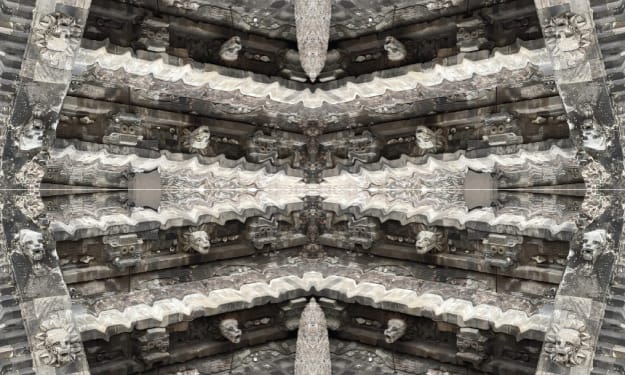Running For Lives
An Olympic marathon runner receives a bet he cannot refuse

Every muscle in Johan’s body screamed in agony and his feet burned as they pounded the road. But he would not stop. He had made a bet. And this was no ordinary bet. Lives depended on him winning.
He hadn’t prepared for anything like this. One marathon, that’s what he had trained for.
One marathon punished your body enough. Seven marathons in seven days was sheer madness. But he’d had to accept the bet.
He had been training for years with a single goal. To get accepted for the American Olympic team and compete in the Berlin Olympics. His hard work had paid off when he the Olympic Committee had offered him a place.
His joy at being accepted had diminished when he had read about the Nuremberg Law.
“Did you read this?” he asked his wife. “The Germans claim that the Jews belong to a different race and are second-class citizens.”
“That can’t be true,” she said elbows deep in dough. She was in the middle of making her signature bread.
“It also says here the Nazi party has banned Jews from public sports facilities and the German Olympic team.”
He caught a drift of her familiar scent as she leant over his shoulder to read the article. A dusting of flour fell on the paper and she brushed it off with a doughy finger and pointed at the final paragraph.
“Look here,” she said. “It says that Avery Brundage, the head of the Olympic Committee, has been to Berlin. He was impressed by what he saw. I’m sure he’d still support the proposed boycott of the Games if he’d found there was anything wrong.”
“Maybe... but remember what cousin Thomas said. How the Nazis have ostracised them and ‘No Jews Welcome’ signs are omnipresent all around Berlin. Maybe I should decline.”
“You can’t, you have worked too hard to give up your place on the team. Besides, the Olympic Games are about the athletes, not about the politics.”
When he still hesitated, she reminded him that by going to Berlin he could find out how many of the reports were true. He could also meet with Thomas. Persuaded, he had accepted his place.
By the time mid-July arrived, and the team travelled to Germany, Johan had heard nothing from Thomas. He had always been a regular letter writer, now they had not received a single letter in six months. He hoped for an opportunity to look for him once he got to Berlin.
At the airport, a fleet of gleaming German cars and two stewards with pained smiles greeted them. From the military precision presses in their trousers, Johan suspected they were not regular stewards.
“I think they are military,” he whispered to his teammate. “They are here to watch us.”
“You might be right,” his teammate whispered back as one steward clicked his heels when he opened the car door to the American team leader. His arm had stopped in an awkward angle, like he had at the last moment remembered not to salute.
Their driver drove them through the pristine city streets. He didn’t appear to understand English, only smiled and apologised when they tried to ask questions. but, Johan had the impression that he was listening to their every word.
He focused on scanning the streets as they drove. There were no infamous ‘No Jews’ signs anywhere, nor people with David’s stars pinned on their clothes.
In his last letter, Thomas had written that the Nazis had forced every Jew to wear yellow stars, and that they were being moved to Jewish quarters. The letter had been brief, as if written in haste, and hadn’t included a new address.
Being only a first generation American, his parents having moved to the States to escape the previous war that had ravaged Europe, Johan spoke fluent German. He resolved to speak to the driver.
“Entschuldigen Sie,” he started.
“Sprechen Sie Deutch?” the driver glanced surprised at Johan through the rearview mirror.
“Yes, my parents are German, from Berlin,” Johan said.
The driver wanted to know more, and they discovered that he came from a nearby neighbourhood in Berlin where Johan’s parents had once lived. As they talked, the driver relaxed and his smile became more genuine. Johan decided to push for information.
“My cousin still lives there,” he told the driver. “Or did until about six months ago.”
“Did he move somewhere else?”
“Yes, or rather he had to move. The trouble is, I don’t where he is now.” Johan focused on the driver’s expression. “He had to move to a Jewish quarter, and he wasn’t able to give us an address when he last wrote to us. That was about six months ago.”
There was a barely perceptible change in the driver, but Johan noted how the smile, though it didn’t falter, became rather fixed.
“Ach, you are a Jew,” the driver said after a minute pause. Johan nodded.
“I’m afraid I don’t what you are referring to,” the driver continued, holding on to the frozen smile but with an undertone to his voice. An undertone of hatred. “I live in Berlin and I have not heard of these ‘Jewish quarters’ you mention. If your cousin has disappeared, you better speak to the Gestapo. If anyone knows where he is, they will.”
Now there was no mistaking the malice. His cold eyes stared at Johan who shuddered.
“Danke,” he said and leaned back in his seat. His teammate shot him an enquiring look.
“Later,” Johan said and focused again on the streets they were passing. He felt rather than noted, since he kept his own eyes on the road, the driver keeping a closer eye on him. He also noticed, when he bent to take his bag from the boot of the car on the arrival to the Olympic village, that the driver pointed him out to one of the stewards. He would have to tread with care if he were to find his cousin.
Over the next few days as more athletes arrived, Johan realised that a German official always tailed him. And though they pretended to speak no English, like the driver, Johan was convinced they understood every word.
“They are monitoring me,” he said to his teammate in the privacy of their bedroom. “Ever since I mentioned my cousin.”
“I’ve noticed, too. There’s always one of them within an earshot. I don’t think you have any chance of finding him.”
“I’ve got to try. Tonight, during the grand reception, I will sneak out. I got one of the German marathoners to admit that there is a Jewish quarter about five miles east from here. I can run there and back.”
“It might be dangerous. What if you get caught?”
“They can’t do anything to me. We are not prisoners here and I am an American. But just in case, I need you to cover for me. If anyone asks, I wasn’t feeling well and went to bed.”
That night, when everyone’s focus was on the welcome speech, Johan withdrew from dinner. Checking no-one had followed him, he broke into a run. Out of the Olympic village and east.
For the first few miles all he saw was a row after row of neat German houses. But then street by street the houses became more run down until he reached a narrow street where they were near derelict.
There was nobody around. Perhaps the German had tricked him. Perhaps there was no Jewish quarter. Then he saw movement. Just the tiniest flicker of the curtain. He approached the house and knocked on the door. At first nobody answered. Johan was about to knock again but then the door inched open. He met a pair of worried eyes.
“I’m looking for the Jewish quarter,” he explained in German. “I’m an American and I believe my cousin has moved here.”
The door opened further, and an arm reached out to pull Johan in to a gloomy corridor.
“Not so loud and not out here,” the man said. He ushered Johan into the kitchen where he faced another twenty pairs of worried eyes.
The man who had opened the door asked Johan to sit down and as he explained about his cousin the atmosphere in the kitchen became more comfortable. At the mention of his cousin’s name, one of the men exclaimed.
“I know Thomas. Son,” he said to a younger copy of himself. “Go get Thomas.”
Within a few minutes Thomas arrived and Johan found out what had happened. One day, five months ago, Thomas had got home from work to find Nazis at their house. They told Thomas that his family had to move to a special Jewish quarter. They told the family take what they could carry with them. The officers assured them that the rest of their belongings and furniture would follow but they never did. And it was best not to ask too many questions. Those who did, had a tendency to disappear.
“Why don’t you leave?” Johan asked.
“We can’t. They took all our papers,” the men explained.
Before Johan had asked all the questions he had, they told him to leave.
“The Nazis have set a curfew for us Jews and if they catch anyone outside after ten, they will arrest them.”
Reluctant to leave without his cousin, Johan departed with promises to do everything possible to help them.
It had looked impossible to do anything for them until an unexpected visitor arrived at the Olympic village. The Fuhrer, who had kept a low profile during the games, expressed a sudden wish to meet the American team. Which was why, two days after Johan’s visit to the Jewish quarter, he and the rest of the team stood in a neat row ready to meet the German leader.
Johan had seen footage of Hitler and expected a powerful man to enter. Instead in walked this small man who shuffled his feet and tried in vain to hide the tremor of his left hand. Hitler greeted the athletes in the line pausing at times to ask a question. He reached Jonah. He stopped.
“So you are the marathoner,” he stated in German. No doubt he knew who Johan was. And about his enquiries. Perhaps he even knew about his visit to the Jewish quarter.
Johan looked up and met the leader’s cold, piercing eyes. They were full of hatred and contempt. His meticulous trimmed moustache twitched slightly in disgust.
The man might have been despicable and hatred-mongering but a power emanated from him. Johan shuddered at the prospect of what this small man could do.
“If I were you, I would focus on the marathon,” he said and the threat was clear. He turned to walk away but Johan found his voice.
“Herr Hitler, I have been to the Jewish quarter,” he said in English. He wanted everyone to understand.
Hitler stopped. He turned on his heels and faced Johan again. “I have a proposal for you. I’ve heard that you are a gambling man and I wonder if I could interest you in a bet.”
Despite his disgust, Hitler appeared intrigued. “Go on.”
“If I beat the German in the marathon, you will allow any Jews in Berlin to leave if they wish.” Johan crossed his fingers as Hitler whispered with one of his advisers.
“My aid has informed me that you are faster than our runner, so that bet is of no interest. However, I have another bet proposal. If you can run seven marathons in seven days, I will honour your request.”
Hitler’s moustache twitched again. This time, it seemed to Johan, with suppressed mirth. He didn’t expect Johan to accept.
But he had accepted and now, seven days later, was only a few miles from finishing the final marathon.
The news of his bet had spread and each day more people lined up the streets, cheering him on. They now shouted encouragement as Johan entered the Olympic Stadium. Just once more around the track. The stadium exploded as he crossed the finish line. He had done it. He had won his bet against Hitler.
As his teammates surrounded him and lifted him in the air, he saw Hitler kick over a bin as he marched into his waiting car.
Two days later, when he arrived at the airport with blistered and bandaged feet, dozens of Jews had arrived to thank him. They had received their papers, and many had already purchased their tickets out of Germany. His cousin was there, too. The Olympic Committee had made special arrangements to allow his cousin with his family to travel to America with the team.
As the plane took off, Johan’s mind was in turmoil. He was amazed that he had won the bet and helped so many Jews. But he was saddened, too. For he was certain that a fate worse than a life in Jewish quarter awaited those who stayed.
I hope you enjoyed this short story and would love you to share it with others. You can also read my other short story - The Watcher (https://vocal.media/humans/the-watcher-x13je0pl1 ), right here on Vocal.
About the Creator
Reija Sillanpaa
A wise person said, "Be your own audience". Therefore, I write fiction, poetry and about matters important and interesting to me. That said, I warmly welcome you into my audience.
Enjoyed the story? Support the Creator.
Subscribe for free to receive all their stories in your feed. You could also pledge your support or give them a one-off tip, letting them know you appreciate their work.






Comments
There are no comments for this story
Be the first to respond and start the conversation.